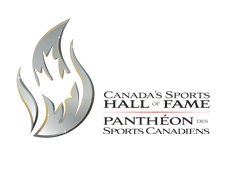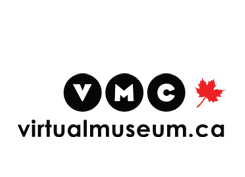Home | Military and Sport | Military Teams
The RCAF Flyers
PreviousNext
Of the many close connections between sport and the military, a major one is the ability of both to produce talented, well-disciplined, focused, competitive and tough soldiers, or athletes. Therefore, when Canada was left without a team to compete in the 1948 London Olympic Games because of the blurred lines over whether amateurs or professionals should play, the obvious place to look for team was the institution that had just come out of a period of prolonged action; namely the military.
With just two days left before the International Ice Hockey Federations Olympic Games entry deadline was to close and two months before the Olympic Games were due to start, Sandy Watson a senior medical officer with the Royal Canadian Air Force was granted permission to 'cobble' together an 'amateur-enough' Canadian team made up of RCAF Flyers. Watson was horrified that the birthplace of hockey was unable to send a team to sport's greatest showpiece occasion and had a deep knowledge of the RCAF hockey teams that had been playing Canadian Army teams in London while waiting to return home after the war had ended.
Needing a coach, Watson approached Sergeant Frank Boucher who had played in the AHL while both his father and uncle had played in the NHL. Together they scoured Canada's air bases looking for players. The only problem was that having spent the previous ten years risking their lives in war, the initial group of 'misfits' were not particularly good at hockey. In their first match, they lost disastrously 7-0 to McGill University and worse was to follow as they suffered a string of further losses. The media were in uproar at the likelihood that Canada would be embarrassed on a global stage.
Even hours before sailing from New York the final team of 17 players were still being put together. But it transpired that one of these last minute players, the replacement goalie Murray Dowey was a star player and when the Olympic Games started the team displayed a remarkable ability to not concede, which was essential in a tournament where the winning team was to be the one with the best record. Rising to the occasion time after time, the 'Flyers' or Canada won every game they played. By the time they played the pre-tournament favorites, the Czechoslovakian team, they managed a goalless draw. At the end of the tournament, both the Canadian and Czechoslovakian teams had the same results; eight wins and one tie. But the Canadians had five shut-outs and so were duly crowned Olympic Champions much to the amazement of the press and the Canadian public.
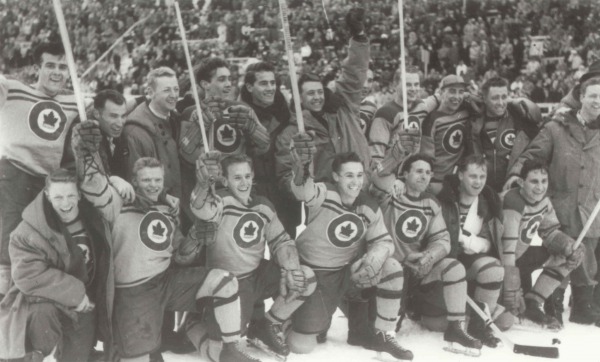
Winning in any sport requires skill, ability, strategy and spirit. The RCAF Flyers were a team put together a few short weeks before going off to play at the Olympic Winter Games. They showed their drive, passion and desire to win throughout all their games and came home with the Gold medal.
Collection: Canada's Sports Hall of Fame
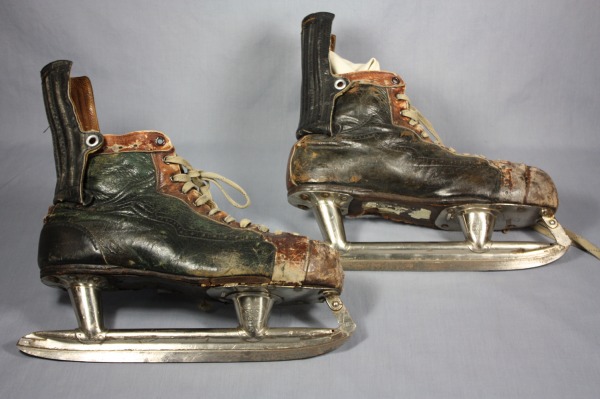
Flight Sergeant Louis Lecompte played defense on the RCAF Flyers hockey team. The games were played on an out-door rink and weather was always a factor in the games, including snowstorms or a warm wind that melted the ice during play. Louis continued his hockey career as a referee and officiated at the 1952 Olympic Winter Games.
Collection: Canada's Sports Hall of Fame
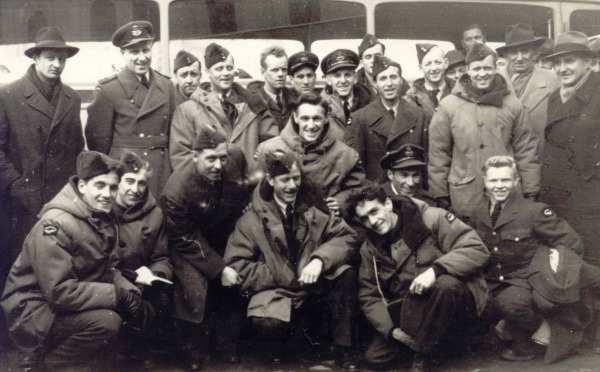
The RCAF Flyers were composed of Air Force personnel and two civilians who were placed on naval reserve. Many players on the team were veterans of World War Two and some were in active service in 1948. Five men on the team had received the Military Cross. They used the discipline and collaboration they learned while serving to produce a Gold medal winning team.
Collection: Canada's Sports Hall of Fame
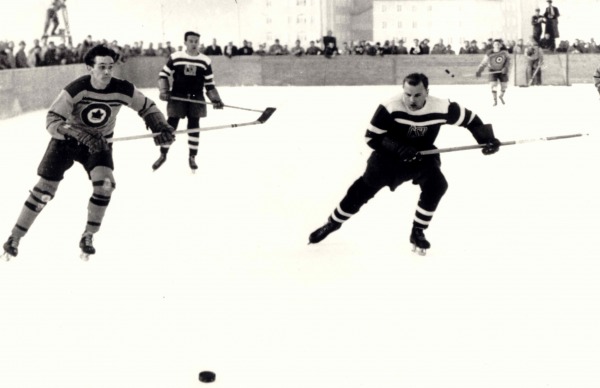
The tournament was a round-robin format. After all the games the RCAF Flyers were in a tie with Czechoslovakia and were awarded the Gold medal on a better goal average. The team showed great poise and confidence throughout the tournament, despite the partisan officiating and spectators who threw snowballs at them.
Collection: Canada's Sports Hall of Fame
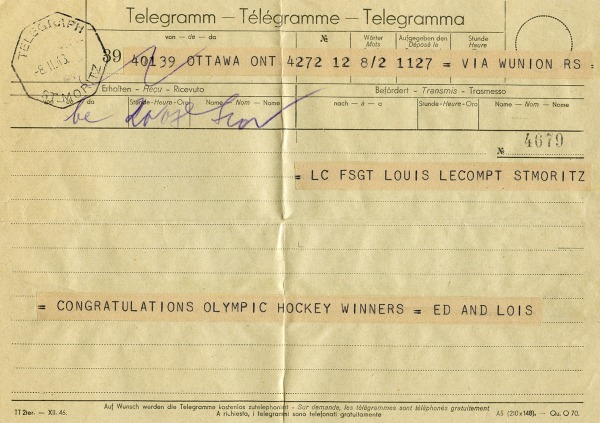
Today we send text messages via the Internet. In 1948 the telegram was the method of sending long distance messages. Louis Lecompte and his teammates received many congratulatory telegrams, which had to be very limited in the amount of words used. The pride of a nation can be read in these few short words.
Collection: Canada's Sports Hall of Fame
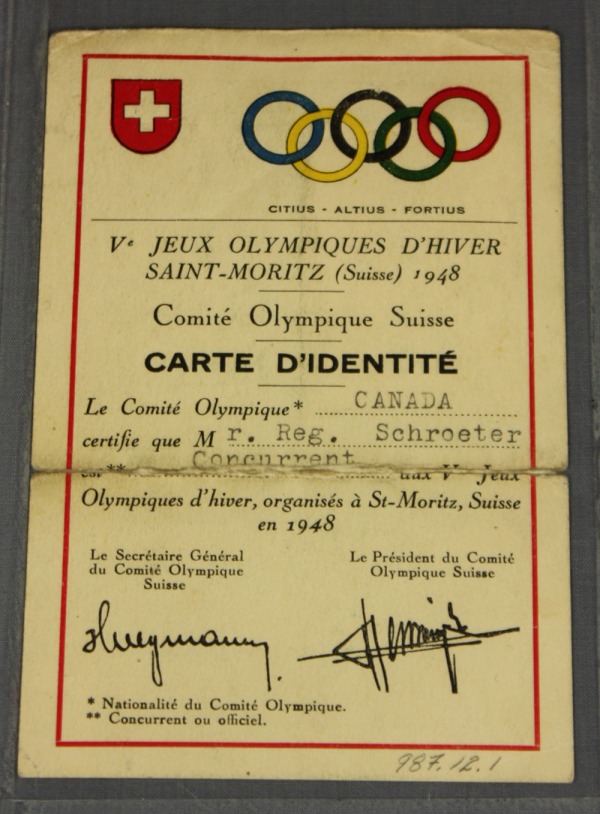
The original 13 members of the RCAF Flyers, selected from a wide roster of players, were defeated in an exhibition game. This led to several players being replaced by new ones, including Reg Schroeter, who played in the forward position. In fact the personnel on the team kept changing up until the boat to Europe actually sailed to participate in the 1948 Olympic Winter Games.
Collection: Canada's Sports Hall of Fame
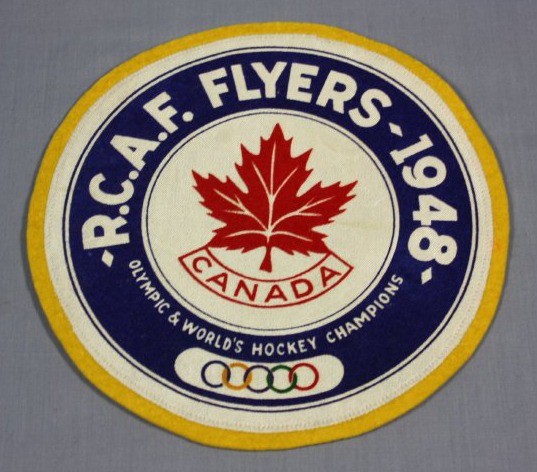
During the 1940's, the World Championships were held consecutively with the Olympic Games. The RCAF Flyers were not only Olympic Champions but World Champions. The team went on to play a series of exhibition games throughout Europe and finally returned home to a hero's welcome in April 1948. Although they disbanded after their return their friendships were lifelong.
Collection: Canada's Sports Hall of Fame
Previous Next
